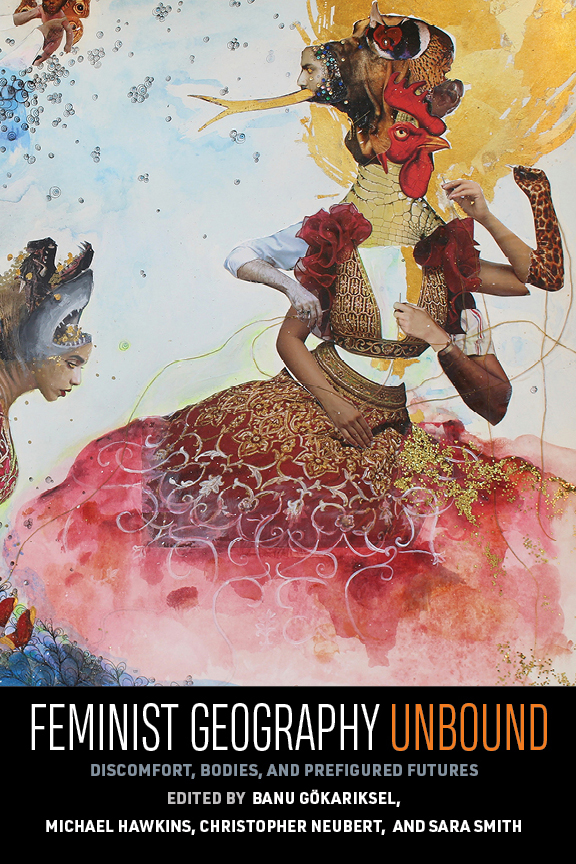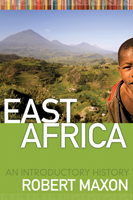Edited by
Banu Gökarıksel,
Michael Hawkins,
Christopher Neubert,
and Sara Smith
March 2021
324pp
PB 978-1-949199-88-8 $29.99
CL 978-1-949199-87-1 $99.99
eBook 978-1-949199-89-5
$29.99
Gender, Feminism, and Geography Series
Feminist Geography Unbound
Discomfort, Bodies, and Prefigured Futures
Summary
Feminist Geography Unbound is a call to action—to expand imaginations and to read and travel more widely and carefully through terrains that have been cast as niche, including Indigenous and decolonial feminisms, Black geographies, and trans geographies. The original essays in this collection center three themes to unbind and enable different feminist futures: discomfort as a site where differences generate both productive and immobilizing frictions, gendered and racialized bodies as sites of political struggle, and the embodied work of building the future.
Drawing on diverse theoretical backgrounds and a range of field sites, contributors consider how race, gender, citizenship, and class often determine who feels comfort and who is tasked with producing it. They work through bodies as terrains of struggle that make claims to space and enact political change, and they ask how these politics prefigure the futures that we fear or desire. The book also champions feminist geography as practice, through interviews with feminist scholars and interludes in which feminist collectives speak to their experience inhabiting and transforming academic spaces. Feminist Geography Unbound is grounded in a feminist geography that has long forced the discipline to grapple with the production of difference, the unequal politics of knowledge production, and gender’s constitutive role in shaping social life.
Contents
Acknowledgments
Introduction
Banu Gökarıksel, Michael Hawkins, Christopher Neubert, and Sara Smith
Part I.
Discomfort across Encounters
1. Brown Scholar, Black Studies: On Suffering, Witness, and Materialist Relationality
Pavithra Vasudevan
2. The Path to Radical Vulnerability: Feminist Praxis and Community Food Collaborations
Carrie Chennault
3. Toilets and the Public Imagination: Planning for Safe and Inclusive Spaces
Rachael Cofield and Petra L. Doan
4. Interview with Kumarini Silva
Part II.
Gendered Bodies as a Terrain of Political Struggle
5. “Real” and “Mythical” Bodies Weaving Social Skin: Two Waorani Women Disrupting Genres of Amazonian Humanity
Gabriela Valdivia, Kati Álvarez, Alicia Weya Cawiya, Manuela Ima Omene, Dayuma Albán, and Flora Lu
6. (Tiny) Houses and Black Feminist Geographic Praxis: Building More Humanly Workable Geographies
Tia-Simone Gardner
7. Decolonizing Development, Challenging Patriarchy: Colonialism, Capitalism, and Gender in Diné Bikeyah
Melanie K. Yazzie and Andrew Curley
8. Women-Only Spaces as a Method of Policing the Category of Woman
Abigail Barefoot
9. Interview with Petra Doan
Part III.
Temporality and Feminist Futures
10. Making Memory: Care and Dalit Feminist Archiving
Anusha Hariharan
11. From the Women’s Movement to the Academy: Feminist Urban Planning, 1970–1985
Bri Gauger
12. Challenging Anglocentric Feminist Geography from Latin American Feminist Debates on Territoriality
Sofia Zaragocin
13. Interview with LaToya Eaves
Interlude: Calling All Collectives
Interviews with Feminist Geography Collectives
Jess Linz, Araby Smyth, Emily Billo, Winifred Curran, Roberta Hawkins, Beverley Mullings, Alison Mountz, Kate Parizeau, Margaret Walton-Roberts, Risa Whitson, Annie Elledge, Caroline Faria, Dominica Whitesell, Danya Al-Saleh, Elsa Noterman, and FLOCK Geography Collective
Afterword
Lorraine Dowler
Contributors
Index
Editors
Banu Gökarıksel is professor, Michael Hawkins and Christopher Neubert are PhD candidates, and Sara Smith is associate professor in the department of geography at the University of North Carolina at Chapel Hill.
Reviews
“Feminist Geography Unbound is a must-read for students and scholars interested in the diversity of feminist geographic thought, action, and activism. This is an exceptionally edited collection of leading scholars’ research and reflections on gender, race, sexuality, identity, vulnerability, and power relations. I highly recommend this book for advanced undergraduate and graduate courses engaging with feminist geographic scholarship and methods.”
Jennifer L. Fluri, coauthor of The Carpetbaggers of Kabul and Other American-Afghan Entanglements: Intimate Development, Geopolitics, and the Currency of Gender and Grief










